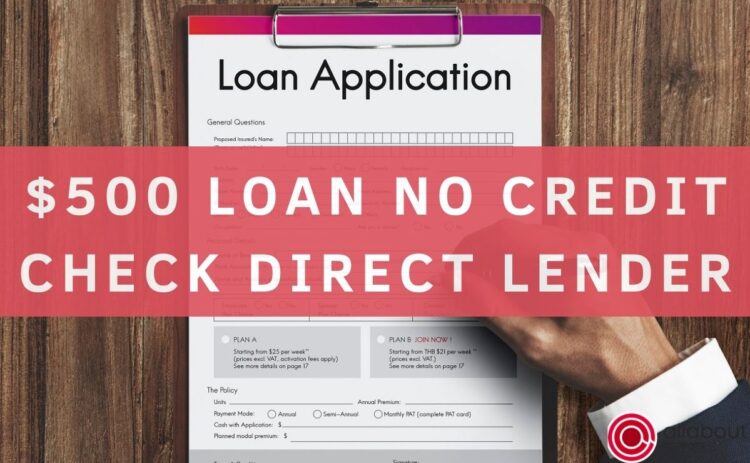Cash Advance No Credit Check Instant Approval Direct Lender

The promise of quick cash, especially when facing urgent financial needs, can be alluring. Increasingly, online lenders are advertising "Cash Advance No Credit Check Instant Approval Direct Lender" services, preying on individuals with limited options and potentially trapping them in cycles of debt. These offers, while seemingly convenient, often mask significant risks that consumers need to understand before committing.
This article delves into the world of these no-credit-check cash advances, examining the pros and cons, potential dangers, and the regulatory landscape surrounding them. We will explore the real cost of these loans, the eligibility requirements, and the alternatives available to borrowers who find themselves in financial straits.
Understanding No-Credit-Check Cash Advances
No-credit-check cash advances are short-term loans marketed to individuals with poor or no credit history. Unlike traditional loans, these lenders typically do not perform a hard credit check with major credit bureaus. Instead, they may rely on alternative data sources to assess an applicant's ability to repay.
Direct lenders are those who fund the loans themselves, rather than acting as brokers who connect borrowers with other lenders. This model can potentially lead to faster processing times and more direct communication, but it doesn't inherently make the loan safer or cheaper.
The "instant approval" claim is a major selling point. The actual time for funds to be deposited can vary, but the allure of a quick decision is undeniably appealing, especially to those facing emergencies.
The Hidden Costs and Risks
While the accessibility of no-credit-check cash advances can be tempting, the associated costs are often exorbitant. Interest rates can be significantly higher than those of traditional loans or credit cards, sometimes reaching triple-digit annual percentage rates (APRs).
Short repayment periods, often just a few weeks or even days, put significant pressure on borrowers to repay quickly. This can lead to a cycle of debt, where borrowers take out new loans to cover existing ones.
Fees, such as origination fees, late payment fees, and rollover fees, can further increase the overall cost of the loan. These fees are often not clearly disclosed upfront, making it difficult for borrowers to accurately assess the true cost.
Many of these lenders operate online, sometimes with limited oversight or regulation. This lack of transparency can make it difficult for borrowers to understand the terms of the loan or seek recourse if problems arise.
“Consumers should exercise extreme caution when considering no-credit-check loans, as they often come with extremely high interest rates and fees that can quickly lead to a debt spiral," says Linda Johnson, a financial advisor with Consumer Credit Counseling Services.
Eligibility and Application Process
While credit history may not be a primary factor, lenders still have eligibility requirements. These typically include proof of income, a valid bank account, and a minimum age requirement.
The application process is usually online and can be completed quickly. However, borrowers should carefully review all terms and conditions before signing any agreements.
Lenders may ask for access to your bank account or paystubs. This access is used to automatically withdraw payments, and it's crucial to understand the implications of granting such access.
Regulation and Consumer Protection
The regulation of no-credit-check cash advances varies by state. Some states have strict usury laws that cap interest rates, while others have more lenient regulations.
The Consumer Financial Protection Bureau (CFPB) is a federal agency that oversees the financial industry and enforces consumer protection laws. The CFPB has taken action against some no-credit-check lenders for deceptive practices and violations of lending laws.
Borrowers should be aware of their rights under state and federal laws. They should also be wary of lenders who are not licensed or who operate outside of the legal framework.
Alternatives to No-Credit-Check Cash Advances
For those facing financial emergencies, there are often better alternatives to no-credit-check cash advances. These include:
- Personal loans from banks or credit unions (may require a credit check but typically offer lower interest rates)
- Credit cards (even those designed for individuals with poor credit can have lower APRs than cash advances)
- Payday alternative loans (PALs) offered by credit unions (capped interest rates and longer repayment periods)
- Borrowing from family or friends
- Negotiating payment plans with creditors
- Seeking assistance from local charities or social service agencies
Exploring these options can help borrowers avoid the pitfalls of high-cost, no-credit-check loans.
The Future of Short-Term Lending
The demand for short-term lending is likely to persist, particularly among those with limited access to traditional financial services. The challenge lies in finding ways to provide access to credit without trapping borrowers in cycles of debt.
Increased regulation and oversight of the industry are needed to protect consumers from predatory lending practices. This includes stricter enforcement of existing laws and regulations, as well as the development of new rules that address the specific risks associated with no-credit-check loans.
Financial literacy education is also crucial. Consumers need to be aware of the true cost of these loans and the alternatives available to them. By making informed decisions, borrowers can avoid falling prey to deceptive marketing and harmful lending practices.
The rise of fintech and alternative lending platforms presents both opportunities and challenges. While these platforms can offer more convenient and accessible lending options, they also require careful scrutiny to ensure they are operating responsibly and fairly. Ultimately, a balanced approach that prioritizes consumer protection and promotes responsible lending is essential to creating a sustainable and equitable financial system.







